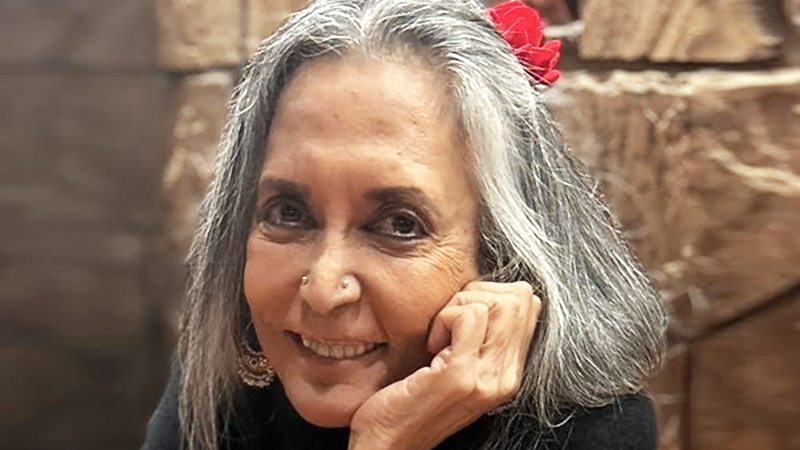There is something in the salt of Amritsar, it births creativity – fashion designers Ritu Kumar and Suneet Varma, actor Akshay Kumar, and film director Deepa Mehta, to name a few. The India-born Canadian filmmaker, Deepa Mehta, was the frontrunner in the cause for the LGBTQ+ community with a then “controversial” movie Fire – part of her Elements Trilogy – in the 1990s. Education has a lot to do with her free thinking, as a product of Welham Girls’ School in Dehradun, and Lady Shri Ram College for Women, New Delhi. But what really prompted a foray into movies was her father, a film distributor in Amritsar. Being exposed to myriad forms of cinema, and knowing she would one day form her own company, Deepa Mehta could see where she was going when it all began with Paul Saltzman, a Canadian documentary filmmaker, who she married soon after.
Few know Mehta has also directed two episodes of George Lucas’ TV series, The Young Indiana Jones Chronicles. And, with her brother Dilip, who is also a filmmaker and photographer, launched a production company called Sunrise Films. Whether it was about widows, separation, or same sex relationships, Mehta was not the one to shy away from taking on topics which were then considered taboo.
She directed Midnight’s Children in 2012, based on the book by Salman Rushdie after which a fatwa was issued by religious extremists. Mehta’s Funny Boy in 2020 was a gay love story set against the backdrop of clashes between the Sinhalese and the Tamils, in Sri Lanka.
With Indian cinema winning honours internationally, what would she attribute the success to? “As a woman filmmaker whose roots go deeply into Indian soil, I am extremely pleased at the recognition Indian films have received at Cannes. It is something to be proud of,” she says. Mehta is not new to international film festivals. Sam & Me starring Om Puri got an honourable mention in the Camera d’Or category of the 1991 Cannes Film Festival.

Talking about I am Sirat, her latest documentary release, she says, “I met Sirat about four years ago on the sets of a dystopian series for Netflix called Leila. I was directing the pilot episode for which Sirat was playing a transgender guard. Her enthusiasm, fearlessness, and dedication to doing her ‘best’ moved me greatly. The documentary we did together started in November 2022. The film was finished in May 2023, and was screened at the Toronto Film Festival in September that year. Since then, it has travelled the world to many prestigious festivals and is currently being streamed on CBC in Canada,” says Mehta.
The high point for Sirat and the filmmaker was the screening of the film in India – in Dharamsala, Delhi, and the Kashish Pride Film Festival, Mumbai. “Sirat and the film were received with such love and generosity that we were overwhelmed. A cultural change takes time, but I believe it [the change] is inevitable,” she adds.
I am Sirat is about a transgender woman, living in Delhi. As Aman, she takes care of her widowed mother, fulfilling the role of a son. From within, she identifies herself as Sirat, a woman. Deepa has shot the film with empathy and sensitivity, two hallmarks of her filmmaking style, and courage above all.
Currently, she is working on a biographical film based on forgiveness, about an Indian woman known to be a serial killer. Titled Troilokya, the film is set in 19th century Kolkata. It mirrors the story of a female prostitute, who goes on a killing spree. Detective Priyonath Mukhopadhyay finally apprehends her. The screenplay is by Juhi Chaturvedi, who wrote for the Amitabh Bachchan starrer Piku.
“Curiosity, I could say without a second thought, is what moves me, and attracts me to stories I intend to tell through films. The Nobel Prize-winning writer Toni Morrison famously said, ‘All art is political’, and I couldn’t agree more. Art in all its forms whether with abandon or with circumspection invariably reflects the times we are living in. And to explore the implications of this time attracts me hugely,” says Mehta.
“Sometimes I feel the world has changed since Fire was first released in India in 1998, and at times it feels it has not really. It’s difficult perhaps for an intrinsically patriarchal society to come to terms with same sex, especially in female relationships.”
There is always social commentary in Mehta’s films, and if you ask her if Water was made today, would it have won an Oscar, she confides: “When I start a film, I really don’t think I am doing it to give a social commentary. Like I said earlier, it is curiosity of a situation that intrigues me to tell a particular story. As for the wins around Water, who knows?”
In 2005, Water opened the Toronto International Film Festival and was nominated for an Academy Award for Best Foreign Language Film, in 2006.

Filmmaking was ingrained in Mehta from a young age, and her daughter Devyani loves films too, “but has zero interest in making them. Her love is curating art. She is currently the Director of Arts at Barbican Centre, London.”
Mehta believes her biggest challenge so far concerning work has been to not give up on Fire and Water after the negative responses in India. “Personally, I just shrug my shoulders and try to cope when difficulties come. Humour helps. My weakness? That is an easy one. I am the most impatient person I know of. I drive my family crazy,” she laughs. – Asmita Aggarwal is fashion & lifestyle editor of nrifocus.com


Leave a Reply